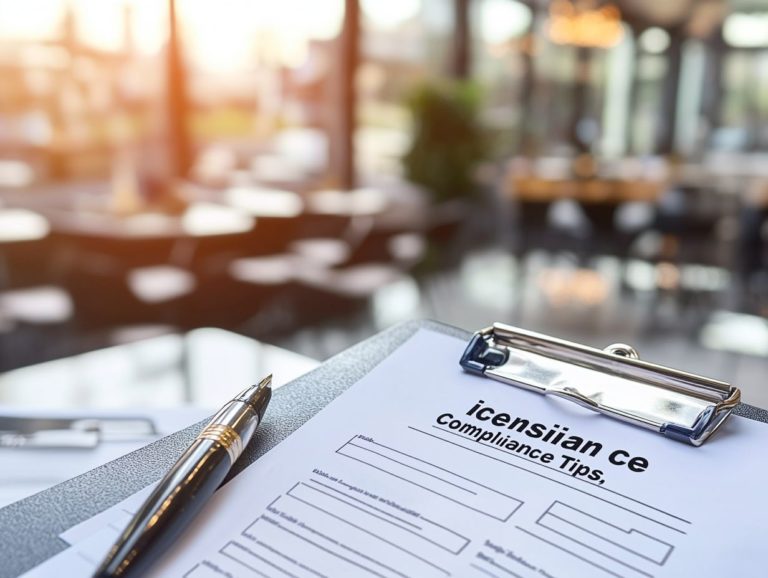How to Spot Unfavorable Terms in Licensing Agreements
Licensing agreements serve as vital instruments in the world of business. They allow you to harness intellectual property while effectively minimizing risks.
Navigating these agreements can be quite the challenge. Spotting unfavorable terms that might jeopardize your rights and interests is crucial.
This article will equip you with a deeper understanding of the key components of licensing agreements. You will learn to identify common red flags and effective strategies for negotiation.
You will also learn when it is prudent to seek professional legal advice. This ensures that you safeguard your business and make well-informed decisions.
Contents
- Key Takeaways:
- Understanding Licensing Agreements
- Identifying Unfavorable Terms
- Consequences of Accepting Unfavorable Terms
- Tips for Negotiating Favorable Terms
- Seeking Professional Advice
- When to Consult a Lawyer
- Final Considerations
- Frequently Asked Questions
- 1. What are licensing agreements and why should you be wary of unfavorable terms?
- 2. What are some common unfavorable terms to look out for in licensing agreements?
- 3. How can I identify unfavorable terms in a licensing agreement?
- 4. Can I negotiate or remove unfavorable terms from a licensing agreement?
- 5. What should I do if I come across unfavorable terms in a licensing agreement?
- 6. How can I protect myself from unfavorable terms in a licensing agreement?
Key Takeaways:

- Always carefully review the terms of a licensing agreement to protect your business and legal rights.
- Watch out for red flags like vague language that may signal unfavorable terms in a licensing agreement.
- Seek professional advice, such as consulting a lawyer, when negotiating a licensing agreement to ensure favorable terms and protect your interests.
Understanding Licensing Agreements
Understanding licensing agreements is essential if your business is involved in the development and distribution of software applications. These agreements dictate the legal use of intellectual property, outline payment terms, and clarify the rights and responsibilities of all parties.
In today s fast-paced digital landscape, protecting intellectual property rights is paramount. Understanding the details of licensing agreements can significantly reduce risks associated with data privacy and compliance laws.
Utilizing platforms like SpeedLegal can simplify the contract review process. This allows you to focus on what truly matters growing your business.
What are Licensing Agreements?
Licensing agreements are legal contracts that grant permission to use someone else’s intellectual property. They often involve proprietary technology or software applications.
These agreements act as a vital bridge between innovation and commercialization. They offer pathways to access intellectual property rights without the hefty costs of developing similar technologies from scratch.
In the technology sector, you’ll encounter various types of licensing agreements. For instance, exclusive rights contracts give one licensee sole usage rights, significantly enhancing their competitive edge.
On the flip side, non-exclusive arrangements allow multiple entities to access the same proprietary technology. This fosters collaborative advancements that can be incredibly beneficial.
Ultimately, understanding these licensing frameworks enables you to leverage your intellectual assets effectively. This drives growth while ensuring compliance with legal standards.
Importance of Reviewing Terms
Reviewing the terms of a licensing agreement is crucial to ensure that everyone’s rights and responsibilities are clearly outlined. This minimizes the risk of potential legal disputes.
You should closely examine the language in the contract. It often includes complex legal jargon that can be tricky to navigate without sufficient knowledge.
Effective contract management requires not just an understanding of these terms but also the ability to spot potential risks that may be lurking within the agreement.
If you’re involved in licensing agreements, seek legal advice to clarify any ambiguous clauses and interpret obligations accurately.
For a successful review, consider these tips:
- Highlighting key responsibilities
- Timelines
- Deliverables
- Considering future amendments or disputes
This careful approach strengthens your business relationships and helps you comply with industry standards.
Identifying Unfavorable Terms
Identifying unfavorable terms within licensing agreements is essential for safeguarding your business’s legal rights. This ensures adherence to industry regulations.
By carefully examining these agreements, you position yourself to mitigate risks effectively and protect your interests.
Take immediate steps to review your licensing agreements to safeguard your business.
Common Red Flags

Common red flags in licensing agreements include vague payment terms, overly broad exclusive rights, and insufficient data privacy provisions.
When payment terms are unclear, disputes over expected revenue can arise, creating tension between the parties and eroding trust.
Broad exclusive rights can restrict your ability to work with other partners, stifling both innovation and competition.
Inadequate data privacy provisions can expose sensitive information to unauthorized access, leading to compliance breaches and significant legal consequences.
These issues present immediate risks and long-term repercussions for businesses operating under such agreements. This underscores the importance of clear, structured, and compliant licensing terms.
Consequences of Accepting Unfavorable Terms
Accepting unfavorable terms in licensing agreements can lead to serious repercussions, including legal disputes, financial losses, and potential harm to your company’s reputation.
You must carefully review these agreements to protect your interests and maintain your standing in the industry.
Impact on Business and Legal Rights
The impact of unfavorable terms on your business can be profound, endangering your creative works and jeopardizing compliance with relevant laws.
Consider a tech startup entering a licensing agreement with difficult terms. Such terms may stunt your ability to innovate and grow.
In another case, a small manufacturing firm faced severe penalties due to licensing terms that required adherence to outdated compliance laws, resulting in costly lawsuits and damage to their reputation.
These scenarios highlight the critical importance of thoroughly reviewing licensing agreements. Protecting your legal rights ensures alignment with current regulations. Neglecting this crucial step can lead to significant financial losses and impede your operational efficiency.
Tips for Negotiating Favorable Terms
Negotiate terms that protect your business and encourage collaboration. By approaching discussions with clarity and confidence, you can secure terms that align with your goals.
Strategies for Negotiation
Effective negotiation strategies for licensing agreements prioritize clarity in payment terms, intellectual property rights, and dispute resolution mechanisms.
Prepare thoroughly to understand both your goals and the other party’s needs. Actively listen to recognize their objectives and constraints.
Such insights enable you to craft mutually beneficial agreements where everyone feels valued. Demonstrating flexibility and willingness to compromise can smooth the path for negotiations.
Collaborative strategies enhance trust and open the door to creative solutions, ensuring that all parties leave the negotiating table satisfied.
Seeking Professional Advice

Seeking professional advice is essential for navigating the complexities of licensing agreements and ensuring compliance with legal standards.
By engaging experts, you enable yourself to make informed decisions that safeguard your interests and facilitate smooth operations.
Don t leave your business at risk; start reviewing your licensing agreements today!
When to Consult a Lawyer
Consulting a lawyer is crucial when drafting, reviewing, or negotiating licensing agreements. Taking action now can help you avoid potential pitfalls and misunderstandings.
If you’re a business entering partnerships or agreements in areas like technology, publishing, or entertainment, you may face complex legal language and specific regulations that can be overwhelming.
By securing professional legal guidance, you can protect your interests and ensure all terms are clearly defined. This significantly reduces the risk of disputes later on.
A lawyer can be your best ally in protecting your ideas and rights!
These proactive steps not only enhance your credibility but also set the stage for smoother collaborations.
Final Considerations
Final considerations in the licensing agreement process require a thorough review of the terms. Engaging in proactive negotiation is key to safeguarding your business’s interests.
Importance of Careful Review and Negotiation
Carefully reviewing and strategically negotiating licensing agreements is essential for protecting your business from unfavorable terms and potential legal issues.
By examining each clause closely, you can ensure that everything aligns with your business goals, effectively identifying any potential red flags.
Using effective negotiation tactics allows for constructive dialogue, making it possible to adjust terms for a better outcome. Focusing on mutual gains rather than taking an adversarial stance encourages collaboration, laying the foundation for lasting partnerships.
When you engage in this meticulous process, you pave the way for agreements that meet not only your current needs but also anticipate future requirements, fostering sustainable growth for your business.
Frequently Asked Questions
1. What are licensing agreements and why should you be wary of unfavorable terms?

Licensing agreements are legal contracts between two parties. The licensor grants permission to the licensee to use their intellectual property in exchange for payment. Spotting unfavorable terms is essential, as they can greatly affect the rights and limitations of the licensee, potentially leading to financial loss or legal issues.
2. What are some common unfavorable terms to look out for in licensing agreements?
Common unfavorable terms in licensing agreements include restrictions on usage, high royalty fees, and lengthy contract durations. To learn more about these issues, check out understanding the implications of licensing agreements. Other red flags consist of vague language, the absence of a termination clause, and a failure to specify the agreement’s scope.
3. How can I identify unfavorable terms in a licensing agreement?
To identify unfavorable terms, carefully review the entire document and pay attention to details. Look for clauses that limit your rights or impose unnecessary restrictions, as well as any clauses that appear unclear or ambiguous.
4. Can I negotiate or remove unfavorable terms from a licensing agreement?
Yes, you can negotiate or remove unfavorable terms from a licensing agreement. It s important to carefully review the terms and discuss any concerns with the licensor before signing. If needed, seek help from a legal professional to assist with negotiations.
5. What should I do if I come across unfavorable terms in a licensing agreement?
If you encounter unfavorable terms, address them with the licensor. Express your concerns and try to negotiate more favorable terms. If the licensor is unwilling to make changes, evaluate whether the agreement is in your best interest, and consider seeking legal advice.
Don’t wait! Review your agreements today and protect your business!
6. How can I protect myself from unfavorable terms in a licensing agreement?
To protect yourself from unfavorable terms in a licensing agreement, it is crucial to read and understand the entire document before signing. Talk to a lawyer to ensure your rights and interests are protected.
You can negotiate for better terms or even walk away if the agreement feels wrong. Don t wait until it s too late! Understanding the terms can save you from costly mistakes.






